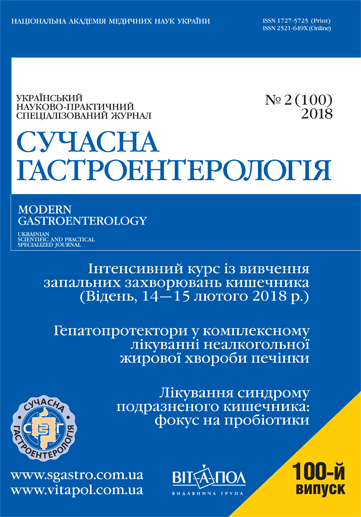Використання інгібіторів протонної помпи у широкій клінічній практиці: переваги та недоліки
Ключові слова:
інгібітори протонної помпи, кислотозалежні захворювання, лікування коморбідної патологіїАнотація
Викладено сучасні погляди на використання інгібіторів протонної помпи у клінічній практиці з урахуванням віку пацієнтів, тривалості терапії, наявності коморбідних захворювань. Проаналізовано дані літератури та рандомізованих контрольованих досліджень щодо ефективності застосування цих засобів у різних клінічних ситуаціях і можливих небажаних виявів. Оскільки інгібітори протонної помпи призначають різним групам пацієнтів, наголошено на необхідності визначення індивідуального ризику виникнення побічної дії.Посилання
Boghossian TA, Rashid FJ, Thompson W et al. Deprescribing versus continuation of chronic proton pump inhibitor use in adults. Cochrane Database Syst Rev. 2017;(3). CD011969.
Boghossian TA, Rashid FJ, Welch V et al. Deprescribing versus continuation of chronic proton pump inhibitor use in adults (protocol). Cochrane Database Syst Rev. 2015;(11). CD011969.
Bundeff AW, Zaiken K. Impact of clinical pharmacists’ recommendations on a proton pump inhibitor taper protocol in an ambulatory care practice. J Manag Care Pharm. 2013;19(4):325-333.
Canadian Institute for Health Information. Prescribed drug spending in Canada, 2013: a focus on public drug programs. North York, ON, Canadian Institute for Health Information. 2015. Available from: https:. secure.cihi.ca/free_products/PrescribedDrugSpendinginCanada_2014_EN.pdf. Accessed 2017 Mar 21.
Canadian Optimal Medication Prescribing and Utilization Service. Evidence for PPI use in gastroesophageal reflux disease, dyspepsia and peptic ulcer disease. Ottawa, ON, Canadian Agency for Drugs and Technologies in Health, 2007.
Chey WD, Wong BC, Practice Parameters Committee of the American College of Gastroenterology. American College of Gastroenterology guideline on the management of Helicobacter pylori infection. Am J Gastroenterol. 2007;102(8):1808-25. Epub 2007 Jun 29.
Farrell B, Tsang C, Raman-Wilms L et al. What are priorities for deprescribing for elderly patients? Capturing the voice of practitioners: a modified Delphi process. PLoS One. 2015;10(4). e0122246 [PMC free article].
Fohl AL, Regal RE. Proton pump inhibitor-associated pneumonia: not a breath of fresh air after all?. World J Gastrointest Pharmacol Ther. 2011;2(3):17-26.
Heidelbaugh JJ, Goldberg KL, Inadomi JM. Overutilization of proton pump inhibitors. P. a review of cost-effectiveness and risk. Am J Gastroenterol. 2009;104 (Suppl 10). P. S27-32.
Heidelbaugh JJ, Kim AH, Chang R, Walker PC. Overutilization of protonpump inhibitors: what the clinician needs to know. Ther Adv Gastroenterol. 2012;5(4):219-232 [PMC free article].
Katz PO, Gerson LB, Vela MF. Guidelines for the diagnosis and management of gastroesophageal reflux disease. Am J Gastroenterol. 2013;108(3):308-328.
Kwok CS, Yeong JK, Loke YK. Meta-analysis: risk of fractures with acidsuppressing medication. Bone. 2011;48(4):768-76. Epub 2010 Dec 23.
Lam JR, Schneider JL, Zhao W, Corley DA. Proton pump inhibitor and histamine 2 receptor antagonist use and vitamin B12 deficiency. JAMA. 2013;310 (22):2435-2442.
Lanza FL, Chan FK, Quigley EM. Practice Parameters Committee of the American College of Gastroenterology. Guidelines for prevention of NSAID-related ulcer complications. Am J Gastroenterol. 2009;104(3):728-738. Epub 2009 Feb 24.
Laine L, Jensen DM. Management of patients with ulcer bleeding. Am J Gastroenterol. 2012;107(3):345-360. Epub 2012 Feb 7.
Lødrup AB, Reimer C, Bytzer P. Systematic review: symptoms of rebound acid hypersecretion following proton pump inhibitor treatment. Scand J Gastroenterol. 2013;48(5):515-522. Epub 2013 Jan 14.
Masclee GM, Sturkenboom MC, Kuipers EJ. A benefit-risk assessment of the use of proton pump inhibitors in the elderly. Drugs Aging. 2014;31(4):263-282.
Metz DC, Pilmer BL, Han C, Perez MC. Withdrawing PPI therapy after healing esophagitis does not worsen symptoms or cause persistent hypergastrinemia: analysis of dexlansoprazole MR clinical trial data. Am J Gastroenterol. 2011;106 (11):1953-1960. Epub 2011 Aug 16.
Naunton M, Peterson GM, Bleasel MD. Overuse of proton pump inhibitors. J Clin Pharm Ther. 2008;25(5):333-340.
Niklasson A, Lindström L, Simrén M et al. Dyspeptic symptom development after discontinuation of a proton pump inhibitor: a double-blind placebo-controlled trial. Am J Gastroenterol. 2010;105(7):1531-1537. Epub 2010 Mar 23.
Pilotto A, Franceschi M, Vitale D et al. The prevalence of diarrhea and its association with drug use in elderly outpatients: a multicenter study. Am J Gastroenterol. 2008;103 (11):2816-2823.
Raghunath AS, Hungin AP, Mason J, Jackson W. Helicobacter pylori eradication in long-term proton pump inhibitor users in primary care: a randomized controlled trial. Aliment Pharmacol Ther. 2007;25(5):585-592.
Top 100 drugs. Pharm Pract. 2013 Mar. 4. Available from: www.canadianhealthcarenetwork.ca/ pharmacists/magazines/pharmacypractice/february-2013. Accessed 2017 Apr 10.
US Food and Drug Administration. FDA drug safety communication: Clostridium difficile-associated diarrhea can be associated with stomach acid drugs known as proton pump inhibitors (PPIs). Silver Spring, MD: US Food and Drug Administration, 2013.
Van der Velden AW, de Wit NJ, Quartero AO et al. Pharmacological dependency in chronic treatment of gastroesophageal reflux disease: a randomized controlled clinical trial. Digestion. 2010;81(1):43-52. Epub 2009 Dec 22.





